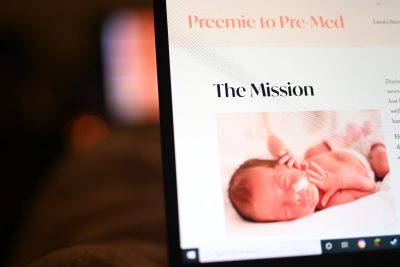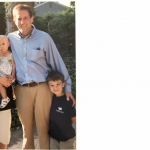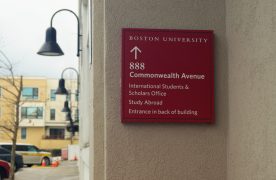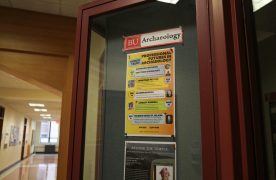Lena Papadakis and her two triplet sisters were born premature at 32 weeks. For much of her childhood, she was in and out of Massachusetts General Hospital with chronic pneumonia and frequent surgeries.

But out of this distress, she grew to love the medical field and is now giving back to the very programs that saved her life.
Currently a pre-medical senior in Boston University’s Sargent College of Health and Rehabilitation Sciences, Papadakis is the founder of the nonprofit Preemie to Pre-Med, a charity supporting child life departments in New England hospitals.
Papadakis said the organization began in August and officially launched Oct. 5 in response to the loss of volunteer teams, as well as cuts to funding, for medical programs like pediatrics as a result of the COVID-19 pandemic.
Her experience as a former patient, Papadakis said, makes her worry about families looking for care during this public health crisis.
“I was meeting a lot of parents that were extremely concerned about their kids that were most likely going to be hospitalized during the pandemic, and these are kids with chronic issues,” Papadakis said. “And I was wondering, ‘What impact would this have on this population of at-risk, vulnerable patients?”
So far, PTP has raised more than $3,300 through social media campaigning, and aims to raise $10,000 for MGH’s John Hancock Child Life and Wellness Program by May 2021.
In raising money online, Papadakis said pediatrics and children’s programs are often underfunded and neglected, though participants in these frequently advocate for other causes on social media.
“I’m really looking forward to seeing where this all goes, especially as we start to get more visibility and people hear about our organization more,” Papadakis said. “No one’s really talking about the impact that all of this is having on pediatric patients.”
Papadakis’s mother, B Papadakis — the charity’s chief financial officer — ran the Boston Marathon for MGH two years ago.
The majority of PTP’s 34 staffers are students, including Sargent sophomore Riya Gopal, one of PTP’s fundraising co-leads, who had heard about the charity through a health sciences newsletter.
Gopal said she and the rest of the team were surprised by the amount they have raised and the awareness the campaign has received. She said the end goal is not financial, however.
“I want to be able to see the impact that our fundraising has,” Gopal said. “It’s not necessarily about the money, but it’s more the indirect impact that the money has on the various children who are at MGH right now and are currently depleted of resources from the global pandemic.”
As part of that fundraising, PTP will be reaching out to organizations to partner with when creating gift baskets — containing supplies such as water bottles and face masks — to distribute to college students for more exposure, Gopal said.
Besides fundraising, the team also has web designers, communication and public relations specialists, and social media managers and analysts.
Benjamin Weitzman, a sophomore in Sargent, is a Facebook analyst at PTP. He creates weekly reports on its engagement and growth on the platform.
Weitzman said on opening week, the group received “hundreds of shares and thousands of dollars in donations,” and has continued to hold donation drives with Instagram story shoutouts, which he said has been successful in keeping up the momentum.
Throughout his time with PTP the past several months, Weitzman said he was grateful for the opportunity to engage with the work he enjoys doing despite hospitals being closed to volunteers.
“I really wanted to volunteer at the local hospitals and local medical facilities and all that, which would have been awesome, but I know that obviously with coronavirus, it’s really hard to get into those things,” Weitzman said. “When I found this program, I knew it was both volunteer-based and really meaningful.”
Papadakis currently interns at Brigham and Women’s Hospital in maternal–fetal medicine, where she conducts remote clinical research on premature babies. She said she hopes to become a doctor in pediatrics, just like those she grew up often seeing when she was ill.
“As a patient who was a multiple and whose mom had a high-risk pregnancy, and to be the reason why it was a high-risk pregnancy, I was the one that was really not doing well,” Papadakis said. “Now I look at high-risk pregnancies, I look at extremely premature babies, I look at what’s wrong with them. And so it’s been a really cool experience to see that on the other side.”
For those without a personal connection to the preemie experience, like Gopal, the charity is enlightening when it comes to the struggles of at-risk babies and young children.
“I think back to my own childhood and I just think about how privileged I was that I was able to lead a very healthy life,” Gopal said, “and I think that every single child absolutely, 100 percent deserves that.”














